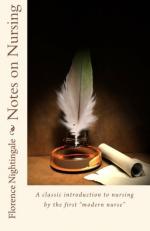[Sidenote: Accidents arising from the nurse’s want of observation.]
Again, a patient not usually confined to bed, is compelled by an attack of diarrhoea, vomiting, or other accident, to keep his bed for a few days; he gets up for the first time, and the nurse lets him go into another room, without coming in, a few minutes afterwards, to look after him. It never occurs to her that he is quite certain to be faint, or cold, or to want something. She says, as her excuse, Oh, he does not like to be fidgetted after. Yes, he said so some weeks ago; but he never said he did not like to be “fidgetted after,” when he is in the state he is in now; and if he did, you ought to make some excuse to go in to him. More patients have been lost in this way than is at all generally known, viz., from relapses brought on by being left for an hour or two faint, or cold, or hungry, after getting up for the first time.
[Sidenote: Is the faculty of observing on the decline?]
Yet it appears that scarcely any improvement in the faculty of observing is being made. Vast has been the increase of knowledge in pathology— that science which teaches us the final change produced by disease on the human frame—scarce any in the art of observing the signs of the change while in progress. Or, rather, is it not to be feared that observation, as an essential part of medicine, has been declining?
Which of us has not heard fifty times, from one or another, a nurse, or a friend of the sick, aye, and a medical friend too, the following remark:—“So A is worse, or B is dead. I saw him the day before; I thought him so much better; there certainly was no appearance from which one could have expected so sudden (?) a change.” I have never heard any one say, though one would think it the more natural thing, “There must have been some appearance, which I should have seen if I had but looked; let me try and remember what there was, that I may observe another time.” No, this is not what people say. They boldly assert that there was nothing to observe, not that their observation was at fault.
Let people who have to observe sickness and death look back and try to register in their observation the appearances which have preceded relapse, attack, or death, and not assert that there were none, or that there were not the right ones.[5]
[Sidenote: Observation of general conditions.]
A want of the habit of observing conditions and an inveterate habit of taking averages are each of them often equally misleading.
Men whose profession like that of medical men leads them to observe only, or chiefly, palpable and permanent organic changes are often just as wrong in their opinion of the result as those who do not observe at all. For instance, there is a broken leg; the surgeon has only to look at it once to know; it will not be different if he sees it in the morning to what it would have been had he seen it in the evening. And in whatever conditions the patient is, or is likely to be, there will still be the broken leg, until it is set. The same with many organic diseases. An experienced physician has but to feel the pulse once, and he knows that there is aneurism which will kill some time or other.




